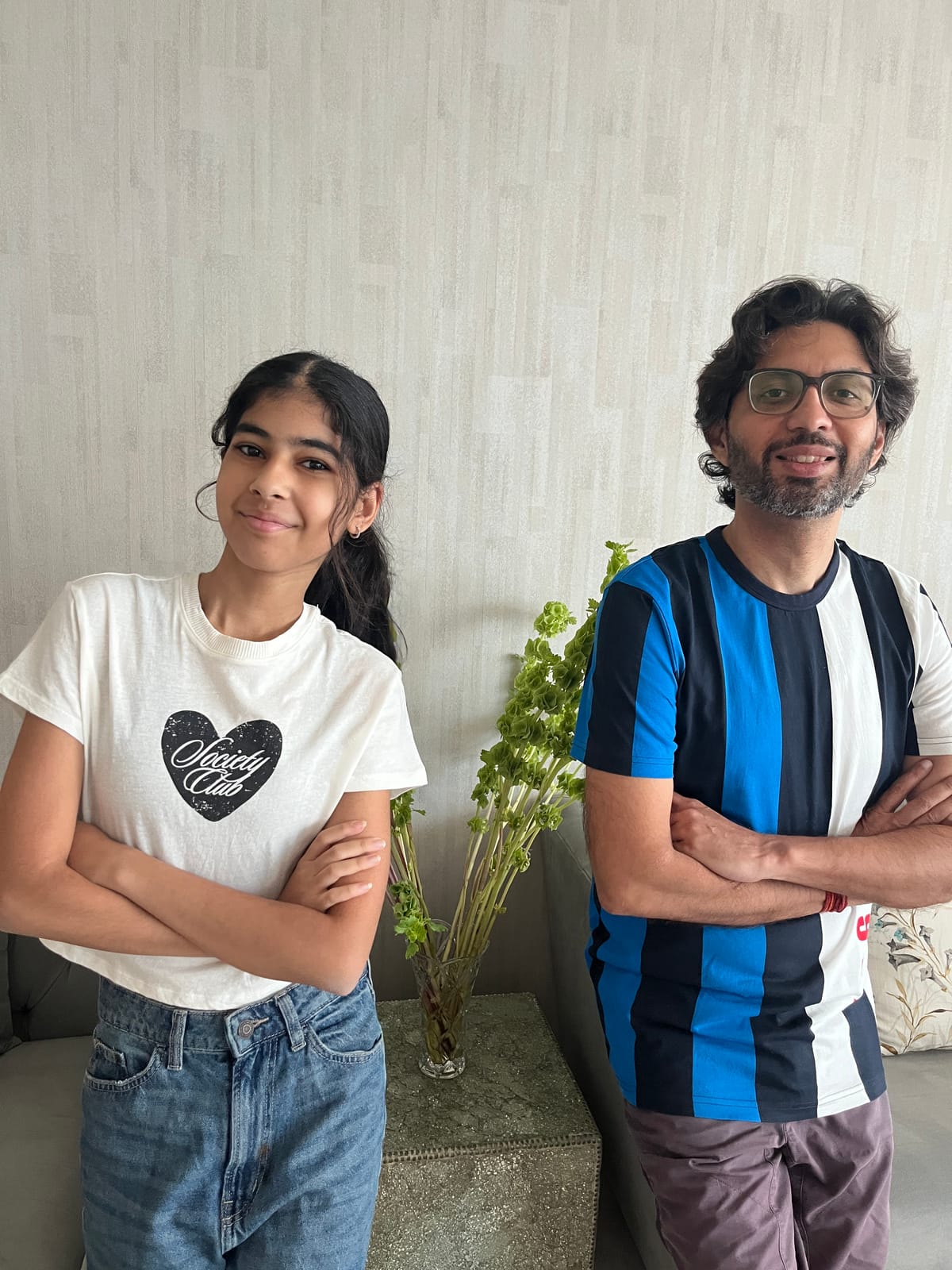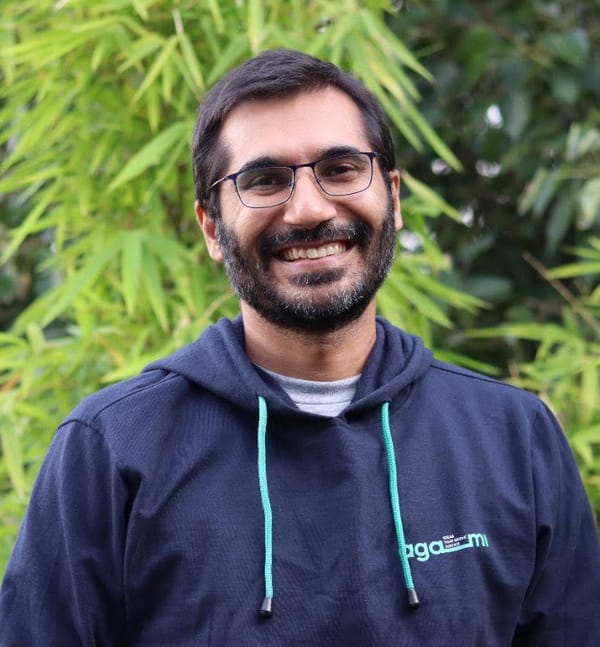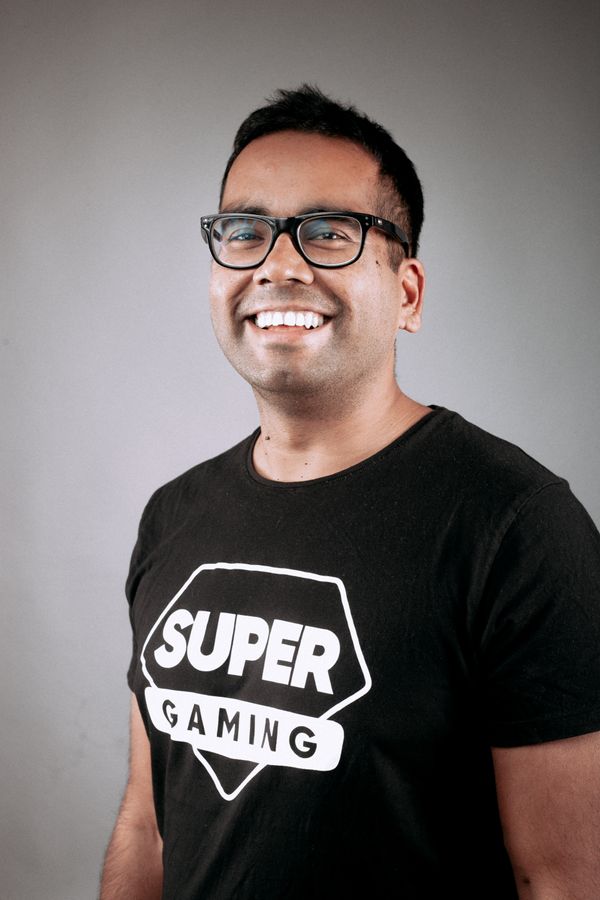Gurugram, India
Many parents despair at how much time their kids spend glued to screens. This study by Kantar for Amazon India is one of many examples that show it's a growing concern for parents worldwide. But most children don't understand the gravity of the screen time problem and decide to do something about it.
13-year-old Naisha Kapoor is different.
"During the Covid quarantine, all school and study was online," she says.
"I’d be watching television or playing games on my phone. It added up to 9 hours of screen time a day! Way too much. It even began to affect my eyes."
Research suggests that too much screen time can adversely affect both physical and mental well-being — and Naisha's parents had begun to notice issues, too. "We spotted behaviour changes, such as a low patience threshold," says Sachin, Naisha's father and business partner. "We felt was a clear tell that excessive screen time was having an effect."
So Naisha and Sachin sat down to discuss the problem and devise a plan. "Over the year, I would be awarded 365 points — one for each day that I minimized my screen time," explains Naisha.
Points could also be deducted for missing homework deadlines or not cultivating good habits. "When you're always on a screen, you stop caring about things like grooming," Naisha admits. "So if I didn't do certain things, like combing my hair every day, I'd lose points."
The father-daughter entrepreneurial team also factored in an incentive. "By the end of the year, if I had at least one point left, I could get anything I wanted under a certain budget."
Each evening, the family tallied Naisha's points. "We had a simple verbal method of keeping score," says Sachin, "and the score for the day became a dinner table conversation."
The challenge ran from January to December 2021, and Naisha nailed it. Her reward was 100,000 Indian rupees (about 1,250 US dollars). Being a savvy kid, "She chose to put part of the money in investments and upgraded her school laptop," says Sachin.
Naisha's reward was big money for a 10-year-old kid. Reflecting on this, Sachin says, "As we went on to develop our startup, research revealed that the price tag of the prize may be inconsequential, and that even a simple thing like a picnic can be an equally good reward."
But cash wasn't Naisha's only win. More importantly, she reaped the rewards of limiting screen time itself.
"She became more confident, found it easier to make connections and friends, and also built a learning mindset, significantly improving her grades."
When Naisha returned to school after Covid lockdowns, she realised her peers were just as addicted to screens as she was. "During school breaks or at friends' birthday parties, I saw that everyone was on their screen rather than talking to each other," she recalls.
"That's when I knew I wanted to help everybody with this issue. I told my dad and he asked me five questions, telling me to get back to him the next morning. I was like — oh, I've got to do research!"
It was a great lesson. "Dad taught me how an idea is like an onion. You need to peel away its layers to get that deep understanding of what you want to achieve."
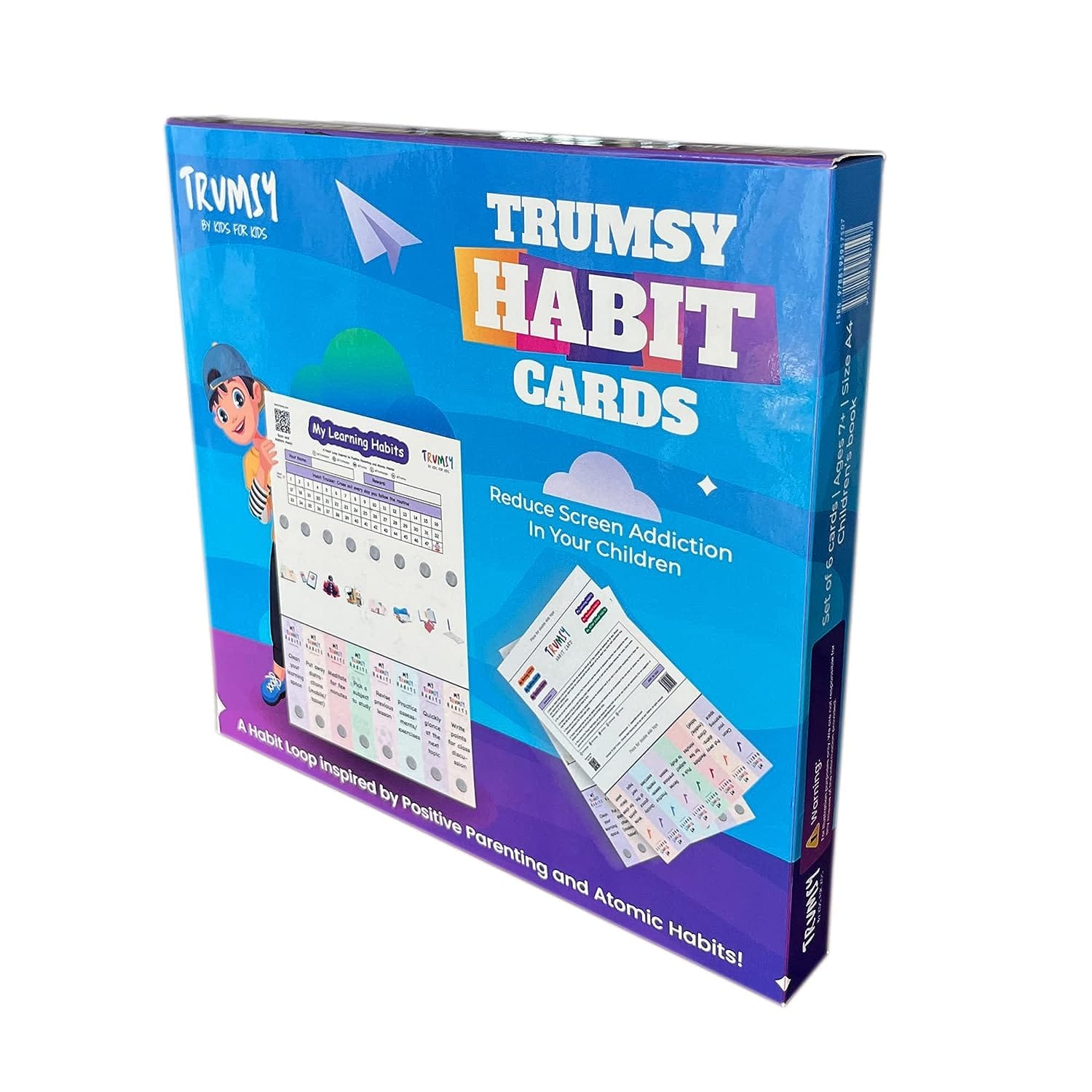
Building an MVP with your dad
Naisha and Sachin decided their initial aim was to help children develop organisational and life skills. In a tribute to her sentiment about navigating life as a preteen, Naisha named their venture Trumsy. "It's a combination of 'Trouble' and 'Clumsy,'" she smiles.
Right from the start, the pair sought input from leading parenting and child-behavior specialists. "I spoke to a range of experts such as Sushant Kalra of the Parwarish Institute of Parenting, educational psychologist Mel Schmitz, paediatrician Dr Miriam Mandel and clinical psychologist and parenting coach Dr Meghna Singhal," says Sachin.
"Our discussions focused on what helps parents give the best environment to raise remarkable children and how screens can be a potential impediment to this."
Based on the input they gathered from experts, it became clear that supporting parents was the key to reducing children's screen time. And to support parents, it was essential to understand what was needed from their kids' point of view. "We surveyed children about which topics they wished their parents knew more about and started creating relevant content, including a parenting blog on our website and our LinkedIn newsletter Parent Connect," says Sachin.
But how could they translate the knowledge they had gained into a practical solution for helping parents get kids off their screens? "It is a big problem to solve without a proven, validated solution," says Sachin.
"There could have been many ways to try and solve this issue, so choosing which one to build was a tough one. We eventually decided to go with what had worked for us."
Although Naisha's at-home challenge had been successful, they knew tallying up points at the dinner table wouldn't work for everyone. "We wanted to make it easily achievable for all parents and children," says Sachin.
The answer they came up with was their first product — not technology-based but in traditional printed form: Trumsy Habit Cards. There are six cards (Morning, Learning, After School, Bedtime, Weekend, and Vacation), and — based on research showing it takes 21 days for a repeated task to become a habit — each card has eight tasks a child must complete daily.
"For example, the Bedtime Habit Card includes checking the next day's timetable, leaving your tablet or mobile alone, and brushing your teeth," says Naisha, who explains exactly how the cards work in this YouTube short.
So, what makes the cards effective in reducing screen time? "Building a daily routine and good habits keeps children away from discretionary screen time," explains Sachin. Inbuilt subtle prompts in the cards — for example, keeping distractions such as mobiles or tablets out of the way — reinforce the message.
"To incentivize children to complete and check off the daily tasks, there is a place for the parent to write down and commit to a reward for the child if they complete all the activities on all of the days."
Sachin and Naisha launched the Habit Cards in March 2023, taking them to the World Book Fair in Delhi, where 280 parents snapped them up, some buying one, some purchasing the whole set of six. "Six months on, we've made over 10,000 sales, mainly through Amazon," says Sachin. "Plus, we've connected with distribution partners such as children's play zones, which now account for 70% of sales. Developing these partnerships has been an important lever for growth.'"
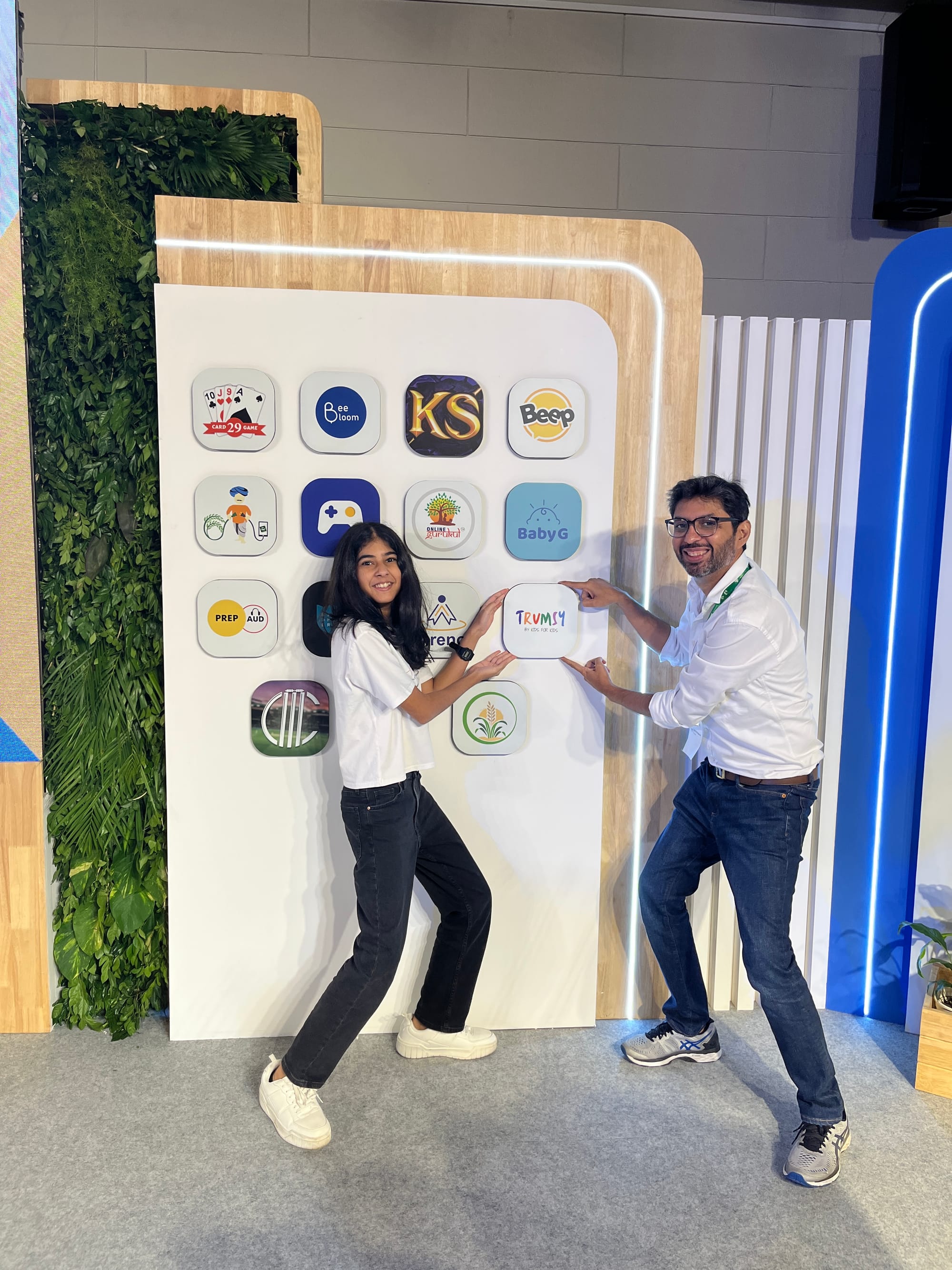
Pivoting to a tech-based product
Seeing the massive interest in their Habit Cards, Naisha and Sachin realised that an app would enable them to take their mission further. "To work out how to develop this, we'd pitch to each other in 'just a minute' jam sessions. It was completely improv!" says Naisha. "We recorded the sessions and then went back and wrote down the important points."
If it seems ironic that a startup dedicated to reducing screen time would launch an app, Sachin explains:
"Research shows that there is productive screen time and unproductive screen time. Our plan is for the app — which we aim to formally launch by the end of this year (2023) — to help parents track this."
The first thing that became clear was that if parents were to get their kids off YouTube or Instagram, they needed something entertaining to tempt them away. "A similar amount of dopamine or success hormone has to be released by that alternative activity as a child would get from playing an online video game or watching a TikTok," explains Sachin.
So, to give kids that buzz, Trumsy offers numerous challenges and competitions, from poster-making contests to lip-sync battles. Parents loved the challenges, asking for more options to keep kids occupied productively. "Now we run classes too," says Naisha. "Recently, I took a class teaching kids how to solve the Rubik's Cube!"
Trumsy also has interest-based groups — from art and creativity to drama — that operate on WhatsApp. Central to the app are habit-building routines, with 130 to choose from. All completed challenges and activities help kids rack up points, which bring a reward from their parents.
The app, though, isn't 'one size fits all'. "Answering multiple-choice questions helps you figure out your parenting style," says Sachin.
"Parents can already customise challenges in the app and we’re developing more features that will enable parents to further tailor their Trumsy experience to themselves and their child."
A community-first approach to growth
Across the app, parenting blog, and WhatsApp groups, Trumsy has already clocked up 5,000 users, and feedback has been overwhelmingly positive. "A doctor and engineer couple told us that their son loves Trumsy competitions so much that screens are no longer his first port of call for entertainment," says Sachin. "They've now asked us to do something about getting him to do homework too!"
"A home-schooling mom with two kids in Mumbai has said Trumsy helps her get back some 'me time.' She has introduced Trumsy competitions to her children and they require minimum supervision."
It's this positive impact on individual users that Trumsy defines as success. "We don't analyse success through vanity metrics such as the number of 'likes,'" says Sachin.
"The most successful aspect of Trumsy so far is the 1500-plus parents in our community who have benefited from reducing screen time in their children. Our community poll gives us an 88% success score on reducing screen time. When we started, we felt even one parent impacted would be a win. Now the number is scaling really fast."
Their rapid growth can primarily be attributed to word-of-mouth advertising. "We have a parent-community-led approach to growing our user base. We get parents to join our messaging communities and introduce them to our solutions. Thereafter, interested parents will start using our mobile application and the different solutions we offer. We rely on user-led growth, where parents who see a positive impact refer other parents to join our community."
To support its growth, Trumsy had to expand its team, including expert app developers, "because neither Naisha nor I are techies!" said Sachin. Today, the team comprises five full-time employees (some working pro bono), three freelancers, and three interns pitching in. They operate from an office in Delhi and are equally passionate about getting kids off screens.
Trumy's employees do everything from keeping up with parenting research and managing content on the app and website to maintaining high engagement in Trumsy's WhatsApp community.
One key team member focuses on finding commercial partners to help with Trumsy's mission. "Our competitions are sponsored by brands with a product or service that is beneficial for children, such as Sekyo which makes child trackers," says Sachin.
"Over 25 brands now work with us as prize sponsors. This helps us test whether what we’re building is commercially viable as well as useful."
The initial relationships forged with parenting experts have grown and strengthened, too. "Dr Meghna Singhal is now a consulting advisor," says Sachin. "We've partnered with Sushant Kalra for parenting advice and coaching. Plus, we've employed a full-time resident counselling psychologist, Bonani Gupta."
Sachin's vision for post-beta Trumsy is to "see ourselves as being a marketplace for parents and children providing solutions across the stack for reducing screen time. For example, activity classes, sports lessons, tuition classes, screen-control software subscriptions, music wearables, toys, and games…"
Naisha's primary role is marketing: monitoring competitions and communities and spreading the word about Trumsy via video. "She's much more natural in front of the camera than me!" laughs Sachin. "Her videos get the highest ranking on any platform for us — LinkedIn, Instagram, YouTube."
Sachin looks after the rest of the business, which is currently funded from his savings, while he works on securing investment. "My wife Neha has taken on the role of sole earning member of the household so we can pursue our passion," says Sachin. "Starting Trumsy wouldn't have been possible without her."
Sachin has a great deal of experience to draw on.
"I spent over two decades in the tech industry with some of the leading names such as LinkedIn, Samsung, Yahoo and Airtel, mainly in product, partnerships or sales roles. This gives me a unique 360-degree perspective into building a sustainable business and prioritising the needs of users."
Complementing Sachin's business acumen is Naisha's youthful perspective. "She tells us very quickly if a suggestion won't work," says Sachin. "Helping us understand the psyche of a child has been invaluable."
"Naisha also helps drive motivation. Many parents, having seen her in action, say how inspiring she is. You can't quantify these things, but they play a big part in this business."
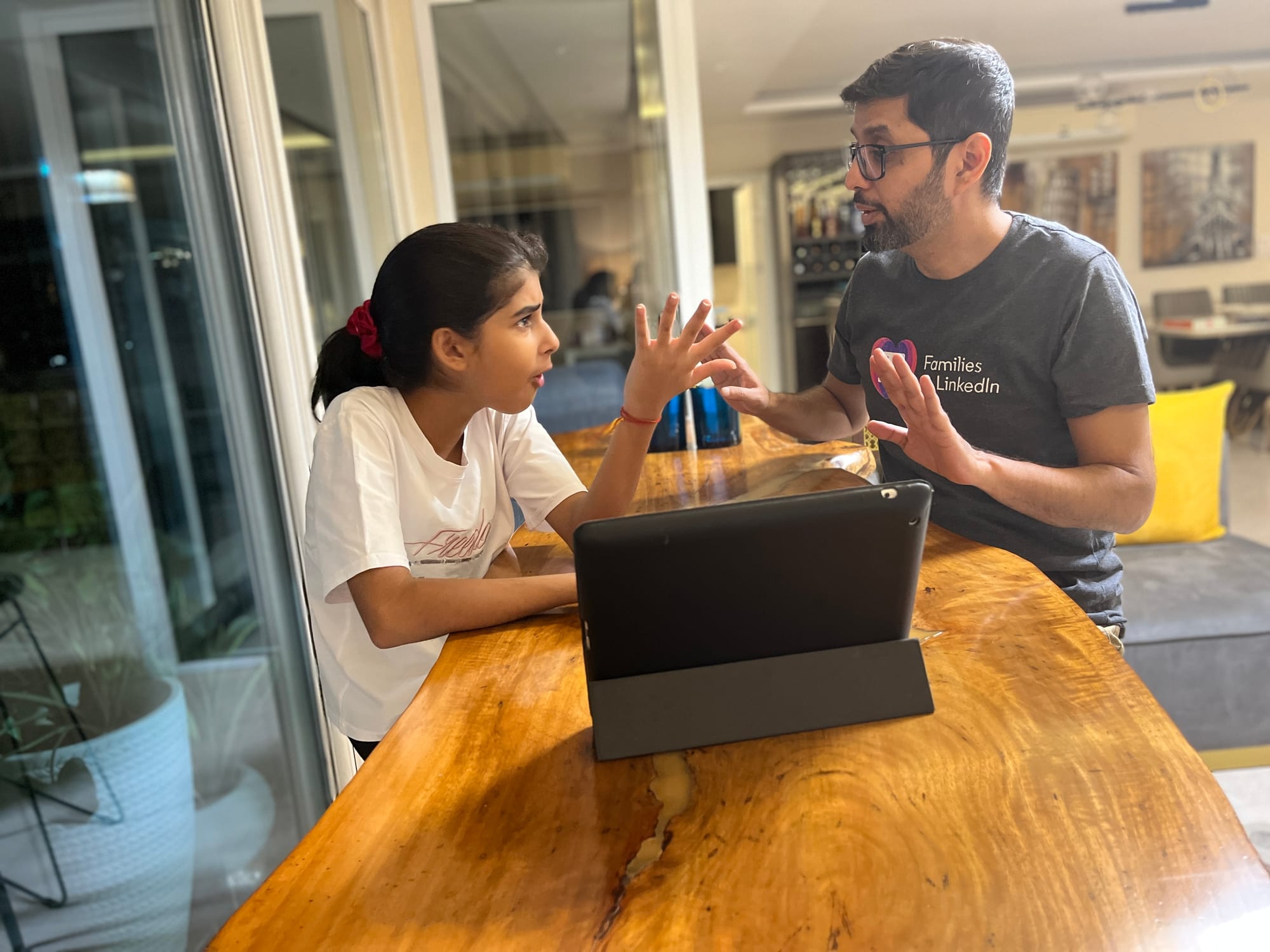
Managing the complexities of a family business
Sachin is clearly proud of his daughter, but can he separate the father and business-partner roles? "I do mix them up sometimes!" he says. "And we have occasional moments like, 'OK, I can't talk to you anymore!'"
"We usually discuss business democratically in a larger group. That helps because it’s not about my voice or Naisha’s voice — the voice of the collective team matters most."
Amongst the warm-hearted banter, it's easy to see there's evident respect between the pair. With a slight smile, the younger of the two quickly adds: "We do try to explain to the other why our idea is better because we both have a competitive spirit!"
When asked for tips on starting a business with a parent, Naisha grins. "Well, I wasn't allowed any social media, but once we started Trumsy and I needed to understand and communicate on our platforms, I got social media!"
"So kids, if you want social media and your parents aren’t allowing you, simply talk to your dad and do a startup with him."
Banter aside, though, is parent-child entrepreneurship for everyone? "Only do it if your value systems match and you have a common vision of where you want to get to," advises Sachin. "You must also have enough tolerance for each other! Living together can make a project easier as you get a lot of time together, but there's a risk of overdoing it. It's been a learning journey for me!"
Sachin's entrepreneurial journey with his daughter has also taught him important life lessons. "She's shown me not to overthink in life, that if you want to do something, you should have the courage to go ahead and do it. So, in some ways, I'm reversing the clock for myself, going back to that freedom."
In his previous working life with the tech industry's big guns, Sachin had to consider the effect on the existing business when planning for growth. "An early-stage startup, though, is about taking your chances," he says.
"It’s a game of probabilities. You run 10 experiments and one is successful. You then double down on it. It’s quite the inverse and a skill I enjoyed learning."
Getting help from startup experts
Earlier this year, Trumsy was selected to attend Appscale Academy. "This is Google's incubator in India, where they support 100 hand-picked apps to improve and grow," explains Sachin.
Trumsy received one-to-one mentoring from app founders with millions of users, including Gaurav Shrishrimal, creator of the mobile office app Kaagaz. "He gave us several pointers to concentrate on, such as keeping the user focused on the objective they started with and ensuring that's been accomplished before opening up other options," says Sachin.
Shrishrimal gave Sachin and Naisha six weeks to implement these insights before returning with an update. "We worked on this, adjusting our user journey accordingly," adds Sachin. "Having somebody take that much interest in your success is invaluable."
Inevitably, novice startup founders have countless questions. "But for every question," says Sachin, "there are hundreds of answers, and you don't know which one to believe. Appscale Academy made a bank of experts — skilled in everything from app store optimization and gamification to user experience and security — available for every kind of question."
One area of expertise Sachin and Naisha found immensely valuable was building a parent community. "Initially, we were getting many downloads but not active users. We decided we needed to change our tactics and build a parent community first before we acquired users. But we weren't clear whether to build that community on our app or on a generally used third-party platform like WhatsApp. Both had their pros and cons. When I searched online, there was no clear recommendation," says Sachin.
"When I asked Appscale Academy expert Mayank Goyal — founder of influencer marketing platform Socialveins — he shared his own journey and learnings. This came with a clear recommendation to start with WhatsApp and build hooks into our app. We tried it, and it worked, saving us up to eight weeks of experimentation and development time."
Naisha also attended some AppScale Academy sessions after school. At one, she delivered an elevator pitch promoting Trumsy. "All the AppScale Academy team were so excited that Naisha was going to present that they came up and encouraged her. This gave a great boost to her confidence," said Sachin.
Clarity was at the heart of Naisha's pitch. "She kept to a single point per slide: our mission, why it's a universal problem, why it's important, why current solutions are inadequate, why the Trumsy approach will work and so on."
Naisha carried off the pitch in style. "I wasn't nervous as I've been making presentations before live audiences for several years," she says confidently.
"In fact, Dad was supposed to do the presentation, but I felt it would have more impact coming from a child. We got one of the best scores in the EdTech category and won the pitch day!"
Despite being the youngest person at Appscale Academy, Naisha's achievement helped Trumsy become one of 30 apps selected to get ongoing personalised support, from tech help to investment advice.
Since Appscale Academy, Trumsy has been featured on a Google Play list of 'inspiring apps made in India,' and Naisha has successfully completed the ThinkStartup Young CEO program at IIT Delhi.
When asked whether she has had any adverse reactions about her age, Naisha laughs. "No — at least not to my face!"
Strengthening family bonds
Both Naisha and Sachin feel working together has benefited their father-daughter bond, but Sachin is particularly proud of what their business journey has done for their personal relationship. "A positive impact of being colleagues is that we are more patient in listening to each other's viewpoint," he says.
"Even in our personal conversations, the more logical person gets their point across. There is a lot more trust and 'I will back you up' feeling."
The father-daughter team has also learnt to create a divide between work and family. "Originally, every time we talked, it would be about Trumsy. Now we have this mutual understanding that we only talk Trumsy for 50% of the time. The rest, we're doing normal dad-daughter stuff."
Sachin says, "By the time children in India reach teenage, only 4% of girls can talk openly with their father about 'growing-up issues.'"
"I'm happy that our relationship is in that 4% because, thanks to our joint mission, we are able to talk about so many different things. From my perspective, that — along with the fact that so soon after launching, we are getting many children off their screens — already makes our venture a success."

